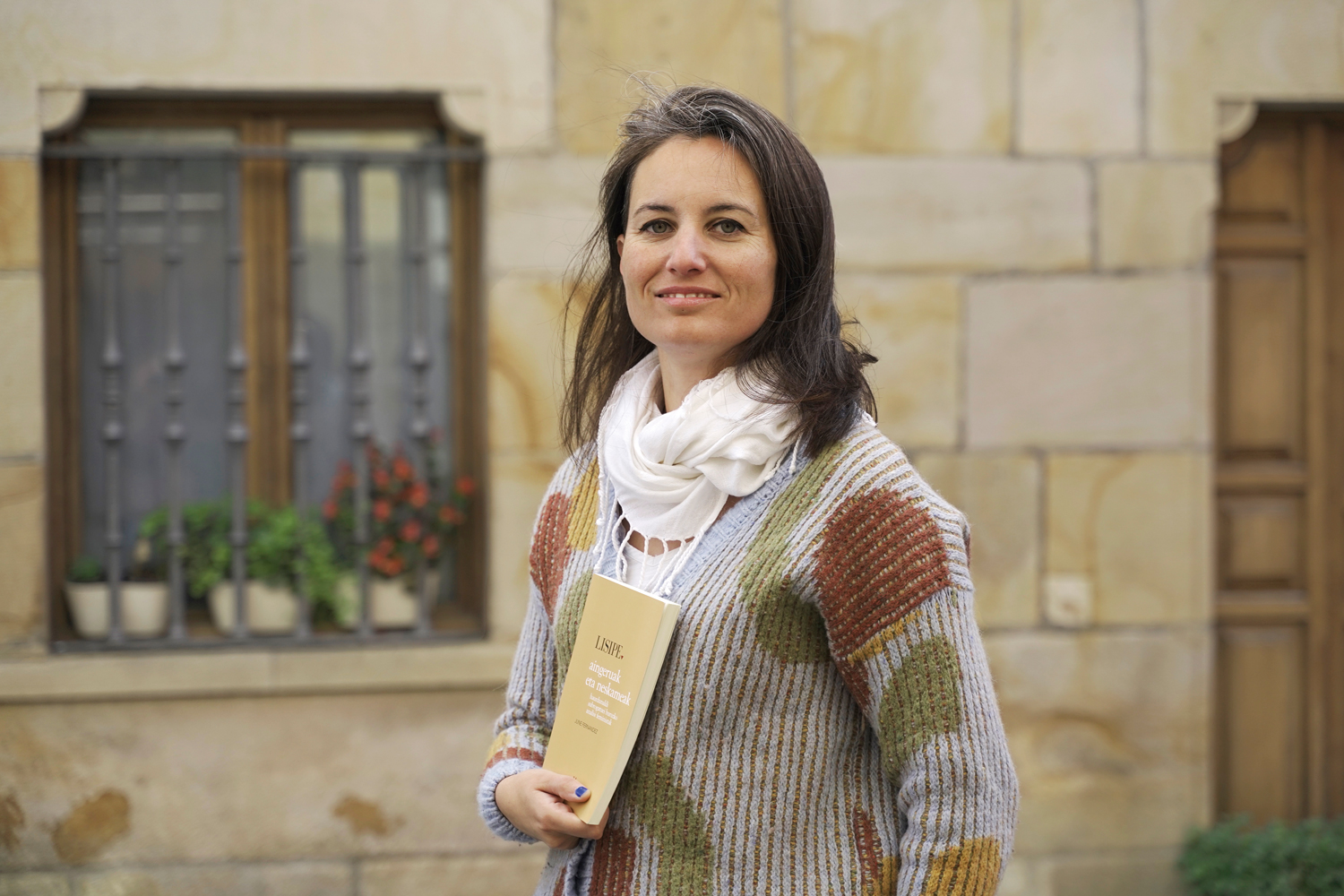"Tendency to slogans and little chance to study shadows of light"
- Angels and servants. The feminist analysis of surrogate pregnancies has just published an essay in the Lisipe collection of the editorial Susa. The journalist escapes extreme positions and makes a deep reflection: "It's easy to maintain an opposing moral and political position, but it's much harder to find a workable solution to this globalized phenomenon." He interviewed 19 feminists from the Basque Country to complete the book.

Is it a taboo subject? Are we not able to talk about the issue calmly and deeply in the Basque Country? The
taboo would not say, it is permanently in the media. That has been a difficulty in the book. The book ended and turned around what was new news that appeared every week. The issue is informative, but at the same time it gets less deep. For example, in the second chapter I analyze the treatment of the issue in the Basque media and the background reports date back to 2017, when Citizens presented their first bill. Since then the tendency has been to draw occasional news, related to the present day, or opinion articles, often from a certain line, very opposite. My premise is that there is a tendency for slogans and less chance of studying the edges and shadows of light carefully. Last year, in Bilbao, a conference was held at the Alhóndiga organized by parents' associations for surrogate pregnancy in which polarization was observed. Internal discourses were super propaganda and there was little criticism, and the slogans of agents concentrated abroad were from the following line: “Against the commercialization of reproduction.” What does that mean? Will we include in the same bag insemination, egg donation and surrogate pregnancy in private clinics? I think it is necessary to clarify.
Is it taboo on the street?
Uf, there it is. In all villages there is a family that has been a father for surrogate pregnancy. On the part of social actors, such as the feminist movement, there is concern to address the issue critically, but at the same time there is concern that we do not want to offend families. Balancing is very difficult. Irantzu [Varela] and Katixa [Agirre] point to the figure of "fathers and mothers of Basque descent": our closest fathers have not “bought” children on women’s farms in India. They'll tell you they've done it in the United States or Canada, with a upper-middle-class manager, with whom they've developed a nice relationship, etc. It has close experiences and does not want to offend these people, but there is a macro system, an industry and some logics that we want to criticize from feminism.
He says that we have positions on both sides, for or against. Is it too simple? Why did you write the book? In
the introduction, I say that I am obsessed with polarised debates. My passion is to get out of those two extremes and find others soluciones.En
the book compares this phenomenon a lot with prostitution. There are common factors: the woman's consensus, "my body is mine"... If you're free to sell sex services, why wouldn't it be to offer a breeding service? For sociologist Sara Lafuente it is more interesting to compare care with home care. The figure of the "puterer", on the contrary, is very stigmatized, is easier and at the same time more difficult to discuss with resident domestic employees. It is clear that slavery is a regime, but we understand that in this context there are a number of structural factors: residences are very expensive, families are increasingly smaller, there is no protection in the self-managed way of caring for elderly or dependent people at home ...
I am interested in collecting what can be learned from the debate on prostitution, for example, that polarisation does not bring anything good, and I am against punitivism. When the abolitionist route is followed, there are many risks, especially the separation of children from their families, as has happened in France and Italy. On the one hand, and on the other, I'm interested in comparing it to intimate work. One argument of feminists against surrounds is that women are locked up on farms working almost 24 hours. This is the situation of resident domestic employees. Why do these feminists not demand the abolition of the resident domestic worker regime?
Indeed, I wanted to ask him about the comparisons he has made in the book. Do these experiences serve to highlight the nuances of this subject? For
example, in feminism, the abolitionist sector has made a kind of ideological group in favor of prostitution, rented abs and the abolition of gender. It's also interesting how Quiran activist Josebe Iturrioz supports the struggle of sex workers, of course, gender self-determination, but it's against rental tents. Look at Ortubay, a reference in criminal law for advocating the decriminalization of sex work. Both say that in the surrogate womb the protagonist is not the woman, but the child, and cannot be the protagonist of a private contract.
I also find interesting what Jule Goikoetxea is proposing. Regardless of gender, reproduction or care, the most important thing is that the expropriated bodies are in the center and that one or another activity depends on heteropatriarchal capitalism.
Tere Maldonado explains very well a philosophical difficulty, that is, there are moral issues here too, which have weight; and morality is very subjective. For example, in feminism, egg donation has been criticized, but in general it does not alter it so much. I was struck by the quote of Pablo [Bilbao], spokesman for Ot Ume Ametsak: his pregnant woman would not be willing to donate eggs because the transfer of the genetic load has more symbolic weight than the fertilization of a person in his abdomen.Es a knot, this practice is judged according to
our parameters, but it is carried out in other countries where the system of values is different. Tere says very well: Where is the limit? What social consensus are basic? It seems that we have agreed not to sell organs, but for others fertilization is unacceptable to some and for others it is not a moral problem. It makes me passionate.
You've told your experience. Have you changed your mind?
Yes, permanently. I think I've changed every conversation when I've done it. For example, in philosophy, Tere Maldonado says that the problem is not the same practice, but that capitalism makes it malignant, because fertilization itself can be pretty. OK. And I hear Josebe, and he says, this is not just another practice of capitalism, it's nuclear, it's a superstrategic line of biotechnological capitalism. That is true! That's how I've been permanently. Katixa and Irantzu are very much against and I have questioned: Have I fallen into moral relativism? Is it so clear and I'm relativizing? But I stay with Paul, listen to his arguments and disassemble many prejuicios.Por
other side, my job has been to contrast the interviewees' arguments with other sources.
He says that the specific objective is to contribute to creating a collective discourse among Basque feminists. In what parameters is the feminist movement discussing? The
Euskal Herria Feminist Movement, the Schools of Empowerment and the Houses of Women have been organizing discussion forums on this topic since 2017. I interviewed speakers at the round tables for the book: Itziar Alkorta, Ianire de la Calva, Josebe Iturrioz and Norma Vázquez. The truth is that, given the depth of the feminist internal debate, collective communiqués are socialized and, as I say, closed refrains predominate in them, as opposed to the commercialization of reproduction, or simplistic readings about the axes of the gender race.
In this sense, it is worth noting the ambitious debate report published in 2017 by the feminist commission of EH Bildu. In line with what Itziar Alkorta argues, seeing that it is a globalised phenomenon, which is incessant, that families are using that path, so that we regulate in ourselves, independently, human rights, without money exchange, supervised by the judges and managed by Osakidetza, and prohibited everything that remains outside. There are also contradictions here, but it is an interesting speech. Oihana Etxebarrieta says they felt quite alone and not very well entendidos.Al talking
about this topic, says that in the equation you have to take into account three axes. Biotechnology is the first. Do we need to set limits?
It is striking that we are now debating the issue of surrogate pregnancies, as if it were a new issue, but one difficulty in fighting it is that in the United States, this practice has been going on for 40 years. It's a stabilized business, you can't disassemble that easily. Paul told me that he was disappointed to see feminism talking abstract, instead of looking at what development has taken place in the countries that have been around for 40 years, etc. On the other hand, the artificial cutters are there. Amaia Pérez Orozco mentions in his book the need for prudence, to curb markets. It says that the hunger of the biotechnology market is enormous, the workforce that we were formerly the working class and now benefits directly from our body. Yes, we should be careful. In the chapter of fiction, he talked about the need for dystopias. I don't have that capacity, but we need to move forward. What will happen to the expansion of artificial cutters?
The
second axis is that surrogate pregnancy is a globalized practice.
Itziar Alkorta rejects the trend of countries that have legalized the altruistic model (Australia, United Kingdom…): many people have continued to migrate abroad because it is easier to carry out the process in a country with a mercantilist model. In addition, markets are closed and opened up. In Thailand and Australia, the law was tightened and private clinics in these countries opened branches elsewhere in Asia. The business remains the same. So why am I excited about this issue? It's like releasing a Rubik cube, for me it's impossible. I am working on the chapter on legislation: where does the road of regulation lead us, where does the road of prohibition lead us … and I find myself a wall.
Is the alternative to the commercial model altruism?
Altruism is constantly questioned in the book. It's a way to precarize women. What and why is it more legitimate to fertilize others for love and generosity and not to improve the material situation of each? Despite the consolidation of the altruistic model, the associations of fathers and mothers supported the proposal of Citizens. This model was altruistic, but rewarded. This means that we sell our work at a low price, and we also have to argue that we do not do it for money, but because we are good women.
In recent years it seems that the commitment of parents' associations is to legalize the altruistic model in exchange for Bavarian money. I think they have defended this because society is not prepared to accept the opposite. It is a criticism that is there, and I find it, that if the altruistic model is legalized it can lead to the normalization of that practice, and the next step would be commodificationn.En the book talks about relational models,
proliferations and collective growth developed together.
One solution would be to change the law. In the case of Hego Euskal Herria, the Spanish Civil Code states that a child may have only two parents. We talked to Borja Muñoz, an EHGAM activist, about how if a child had the opportunity to have three parents it would be possible to recognize the pregnant woman and if they want to be parents, for example, the couple of men. It makes me stimulant instead of going to the market, to see that one person is willing to give gametes, that another wants to germinate, that others want to grow at home, and they can all be reference figures for the child. For children, it is very different that it is produced by a person who has made money in another country or that it is a nearby process where the child knows its origin, etc.
Elixabe [Imaz] ironizes and says that parents who have germinated in the United States or Canada say that the pregnant woman “is from our family”, comes once a year on vacation and is familiar. Wouldn't it be more viable to do it among us, in the community?
However, it is a rather utopian path, because we live in a super-individualistic and atomized society. Many parents say: I don't have the opportunity to build such a fantasy.
What is the urgency?States
and the judiciary have seen the need to ensure children's filiation. The European institutions have said that surrogate pregnancy is a practice of exploitation, that it must be banned … but the tendency is to focus the right of filiation of children. Protecting children is therefore a priority, but what is protecting children? The opposed feminists say that these families have decided to create a child in an irregular situation. As a bun mother, if my struggle is to guarantee the recognition of motherhood of my other mother, not the manager, why not in other models? If I am afraid that my child will administratively lose a mother, how will I not empathize with families by subrogation?More concern: how to reconcile criticism of this
system and avoid stigmatization against children and families. A family claim is to have positive referents. Paul said that in a conservatory there was a banner that said that the rental tents are exploitation. Some children coming to this conservatory were fertilized by surrogate pregnancy.
Have you answered or have more questions than before when writing the book?
I remain the same. I did the book in 2023, but I'm working on it since 2018, and the knots are not released. What does a mother person do? Contracts? Biological links by gametes? Or pregnancy and childbirth? I believe that paternity must be social. Knots are huge. We have not mentioned the adoption and it is interesting. I have argued from the outset that simplistic speeches should not be made: "Don't buy the kids, adopt!" or "the solution is to facilitate adoption". This discourse is not appropriate, precisely the adoption system has been made difficult to prevent abuses. Other: "These parents are narcissists because they want to have a genetic link", because it is not always true, I was surprised to see that many parents have initiated or carried out adoption processes, and that in many cases children and ova are from donors... And have we all ignored the importance of the genetic link? Or to say that they have their children as goods, and not others? In adoption it has also been difficult to recognize the right to know the origin of children. Associations of surrogate families favour the right to know the origin of children.
My obsessions haven't changed in the process. Another obsession is the anti-cholonal and anti-arrasist perspective. Some of our speeches are from the savior. We are still talking about women’s farms in India, not to mention that governments long ago closed the door to foreigners and put in an altruistic model. Norma Vázquez and Cristina Zamora explain that the discourse of white feminism is very ethnocentric, for example linked to the theory of adhesió n.La
contribution of the gypsies is also interesting. Tamara and Mari Mar Clavería are strongly against surrogate pregnancy, but stress that in their culture there are community dynamics. If someone cannot have children, a nephew will grow up or become more involved as a godmother or godfather. From the
beginning I had the premise of learning from other cultures to open my eyes and have reinforced it.
Onintza Enbeita denounced gordophobia in her column on October 4 in relation to the experience of a visit to the gynecologist. It can be said that we are all committed to entering the same body, and it is true, we have all heard what it is, but it is also true -- that what is... [+]
A few months ago, the sister had to interrupt her five-month pregnancy because of a mental deformation she was carrying with her. The decision was made between tears and five days after the news the child (Xoán) was in labor at the Cruces Hospital (they abort with the delivery... [+]
























